

Acemoglu and Robinson: Why Nations Fail. Why Nations Fail I would tend to add to what Robinson has to say that extractive economic institutions tend to actively promote and fund extractive political movements, laws, public policy, and systems of both the left and the right.
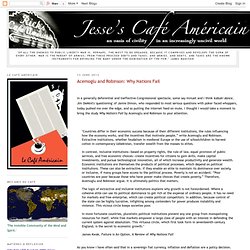
Even the subversion of effective government and a descent into near anarchy can serve the monied interests, because effective democratic government is a counterbalance against private power. "To know what Fascism really is we must first of all know what it is we are fighting, what the Fascist regimes really are and do, who puts up the money and backs Fascism in every country, and who owns the nations under such regimes, and why the natives of all Fascist countries must be driven into harder work, less money, reduced standards of living, poverty and desperation so that the men and corporations who found, subsidize and own Fascism can grow unbelievably rich.
" George Seldes, 1943. Creating a Learning Society. Contingent pathways in Eurasian history. Economic historians and historians of Asia have been deeply involved in a debate with long roots: Why did modern economic development occur first and most consistently in western Europe in the seventeenth century, and why did China not capitalize on its many advantages in the early Qing Dynasty to take the lead?
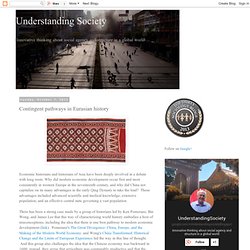
Those advantages included advanced scientific and medical knowledge; extensive population; and an effective central state governing a vast population. There has been a strong case made by a group of historians led by Ken Pomeranz, Bin Wong, and James Lee that this way of characterizing world history embodies a host of misconceptions, including the idea that there is one best pathway to modern economic development (link). Is South-South economic interaction any better for poor countries? Jayati Ghosh It used to be believed that that economic interaction between developing countries (South-South integration) would necessarily be more beneficial than North-South links.

Pettis: China and the History of US Growth Models. Yves here.
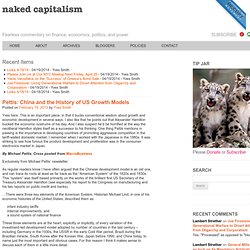
This is an important piece, in that it bucks conventional wisdom about growth and economic development in several ways. I also like that he points out that Alexander Hamilton bucked the economic nostrums of his day. And I also suspect he’d be horrified at the way the neoliberal Hamilton styles itself as a successor to his thinking. How the World Works - James Fallows.
Americans persist in thinking that Adam Smith's rules for free trade are the only legitimate ones.
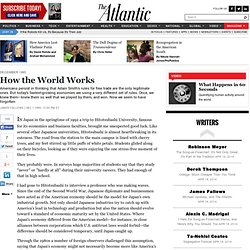
But today's fastest-growing economies are using a very different set of rules. Once, we knew them—knew them so well that we played by them, and won. Now we seem to have forgotten IN Japan in the springtime of 1992 a trip to Hitotsubashi University, famous for its economics and business faculties, brought me unexpected good luck. Like several other Japanese universities, Hitotsubashi is almost heartbreaking in its cuteness. They probably were. I had gone to Hitotsubashi to interview a professor who was making waves.
Through the 1980s a number of foreign observers challenged this assumption, saying that Japan's economy might not necessarily become more like America's with the passing years. On the way back to the station I saw a bookstore sign advertising Western-language books for sale. Friedrich List! One was a biography, by a professor in the north of England. Fake It Till You Make It. No one knows for sure why some societies are more innovative than others.

Finance & development? The fiscal cost of trade liberalisation. As usual in times of economic peril, protectionism is back (Evenett 2012).
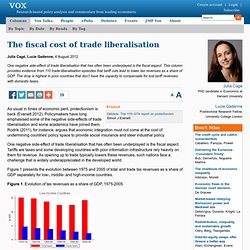
Policymakers have long emphasised some of the negative side-effects of trade liberalisation and some academics have joined them. Rodrik (2011), for instance, argues that economic integration must not come at the cost of undermining countries' policy space to provide social insurance and steer industrial policy. One negative side-effect of trade liberalisation that has often been underplayed is the fiscal aspect. Tariffs are taxes and some developing countries with poor information infrastructure rely heavily on them for revenue. As opening up to trade typically lowers these revenues, such nations face a challenge that is widely underappreciated in the developed world. Policies for Inclusive and Balanced Growth - Video and audio - News and media. Speaker(s): Heiner Flassbeck, Professor Robert Wade Chair: Dr Jean-Paul Faguet Recorded on 11 September 2012 in Hong Kong Theatre, Clement House.
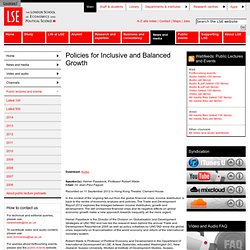
In the context of the ongoing fall-out from the global financial crisis, income distribution is back to the centre of economic analysis and policies. The Trade and Development Report 2012 explores the linkages between income distribution, growth and development. The still unresolved financial crisis and its negative effects on global economic growth make a new approach towards inequality all the more urgent.
IFIs... The Washington Consensus. "Doing Development Better" by Dani Rodrik. Exit from comment view mode.
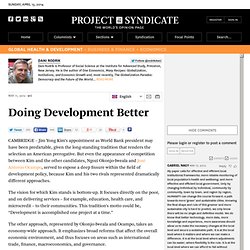
Click to hide this space CAMBRIDGE – Jim Yong Kim’s appointment as World Bank president may have been predictable, given the long-standing tradition that renders the selection an American prerogative. But even the appearance of competition between Kim and the other candidates, Ngozi Okonjo-Iweala and José Antonio Ocampo, served to expose a deep fissure within the field of development policy, because Kim and his two rivals represented dramatically different approaches. The vision for which Kim stands is bottom-up. It focuses directly on the poor, and on delivering services – for example, education, health care, and microcredit – to their communities. The other approach, represented by Okonjo-Iweala and Ocampo, takes an economy-wide approach. Practitioners in the first group idolize NGO leaders like Mohammad Yunus, whose Grameen Bank pioneered microfinance, and Ela Bhatt, a founder of India’s Self-Employment Women’s Association (SEWA).
Poverty. Microfinance. Development - curators... To sort... Development: Reading...